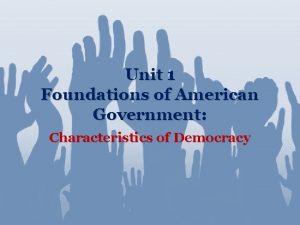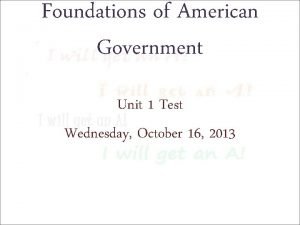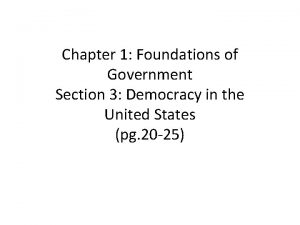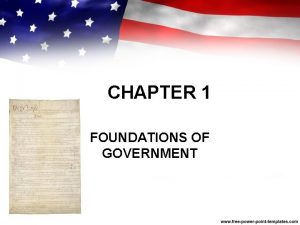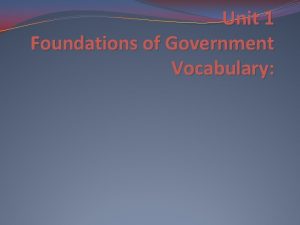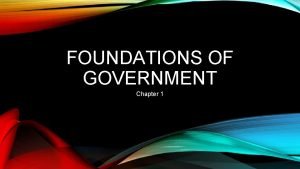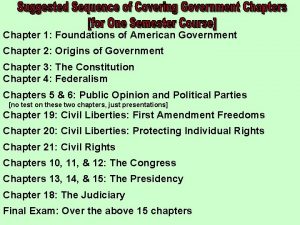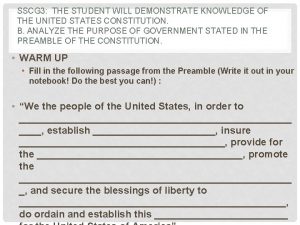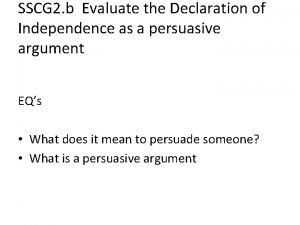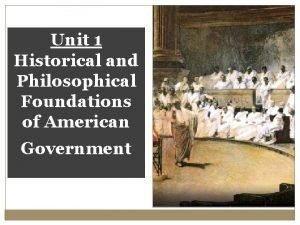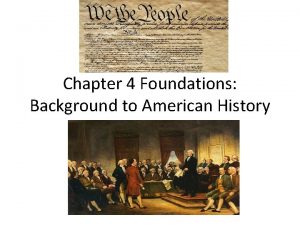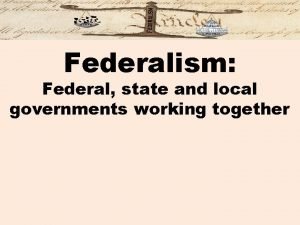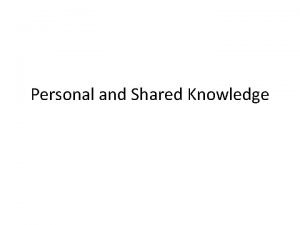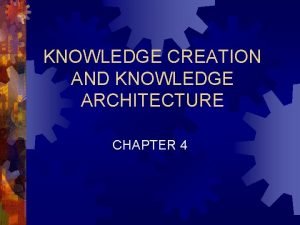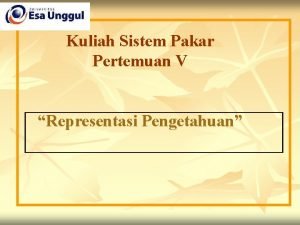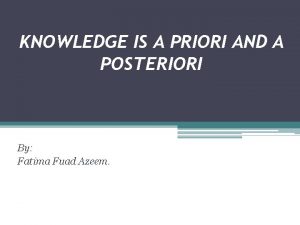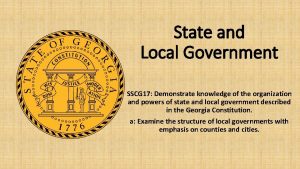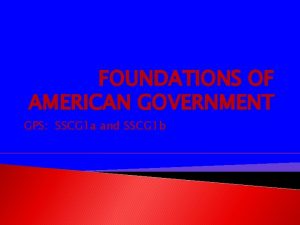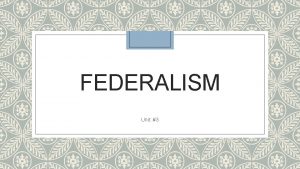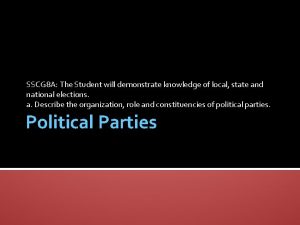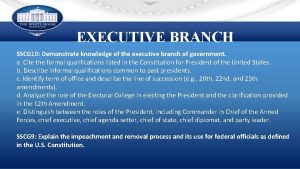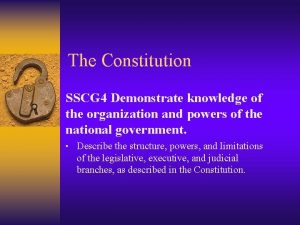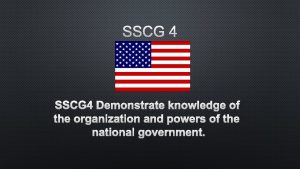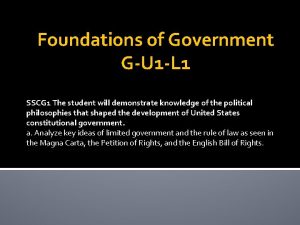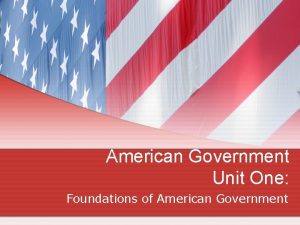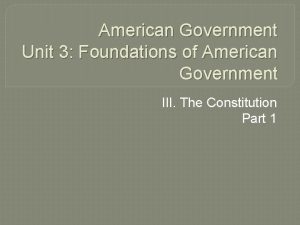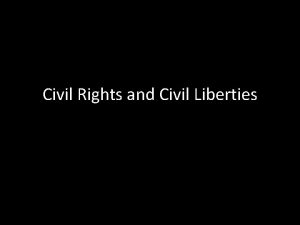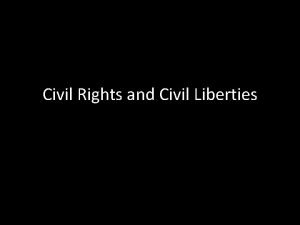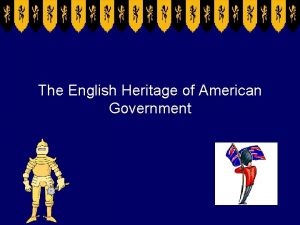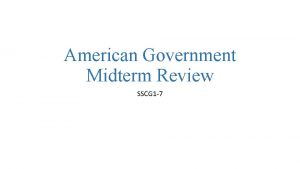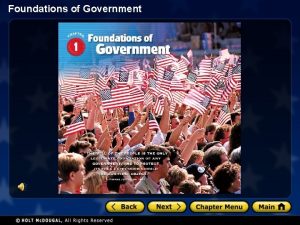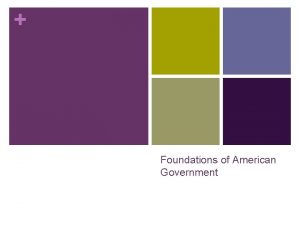Foundations of American Government SSCG 2 Demonstrate knowledge

























- Slides: 25

Foundations of American Government SSCG 2: Demonstrate knowledge of the political philosophies that shaped the development of United States constitutional government.

Standard Overview • SSCG 2: Demonstrate knowledge of the political philosophies that shaped the development of United States constitutional government. • SSCG 2 a: Analyze key ideas of limited government and the rule of law as seen in the Magna Carta, the Petition of Right, and the English Bill of Rights.

Bell Ringer • What are the main beliefs of John Locke, Thomas Hobbes, Montesqieu? • Describe each.

Foundational Documents • 1215 – the Magna Carta, forced limitations on King John of England by a group of feudal barons who were seeking to limit the power of the King.

Foundational Documents • The Magna Carta introduced the ideas of limited government, due process of law, trial by jury, and the protection of private property and civil liberties. • The Magna Carta established that the power of the monarchy was not absolute.

Foundational Documents • 1628 – a document called the Petition of Right was signed by King Charles I of England. • By this time, England had a Parliament, but the monarchy still exercised great power over the people. The King asked Parliament for more money in taxes for war; in return for the money, Parliament forced Charles I to sign the Petition of Right. • The rights established by this document included: no cruel punishment, no excessive bail or fines, the right to bear arms, and the right to petition.

Bell Ringer • What document signed in 1215 was the first time that a king limited his own power? • How did the Petition of Right influence the constitution? • Which King signed the Petition of Right?

Foundational Documents • The King could no longer declare martial law in times of peace or require homeowners to share their home with the King’s troops without permission from the owner, and the document required the punishment of any person to be determined by a judgment of his peers. • The Petition of Right challenged the divine right theory; even monarchs were expected to obey the law of the land.

Foundational Documents • 1689 – the English Bill of Rights was passed by English Parliament. • The document prohibited a standing army during peacetime, unless Parliament gives consent and required that all parliamentary elections be free.

Foundational Documents • The monarchy was forbidden to create and collect taxes without consent of Parliament. • The citizens were given the right to petition the king without the fear of being punished.

Standard Overview • SSCG 2: Demonstrate knowledge of the political philosophies that shaped the development of United States constitutional government. • SSCG 2 b: Analyze the impact of the writings of Hobbes (Leviathan), Locke (Second Treatise on Government), Rousseau (The Social Contract), and Montesquieu (The Spirit of the Laws) on our concept of government.

The Enlightenment Philosophers • Thomas Hobbes (1588 – 1679) was a political philosopher. His book, Leviathan, was written in 1651, and established the foundation for most of western political philosophy from the perspective of social contract theory. • Hobbes described the state of nature where all individuals were naturally equal and morally bad. • Every person was free to do what was needed for survival.

The Enlightenment Philosophers • According to Hobbes, the only way out of this situation is to create a supreme power to impose peace. • Hobbes asserted that people agreed among themselves to ‘lay down’ their natural rights of equality and freedom to give absolute power to a sovereign.

The Enlightenment Philosophers • John Locke (1632 – 1704) – Locke was an English philosopher and physician. He is considered one of the most influential Enlightenment thinkers. • He studied science and medicine at Oxford University and became a professor there. In 1690, he published Two Treatises of Government. He agreed with Hobbes about the need for a social contract to assure peace.

The Enlightenment Philosophers • Locke disagreed with Hobbes on two points: • 1) Locke argued that natural rights, such as life, liberty, and property, existed in a state of nature and could not be taken away or voluntarily surrendered. These rights are ‘unalienable’, or impossible to surrender.

The Enlightenment Philosophers • 2) Locke disagreed with the social contract and stated that the agreement was not just among the people but between the people and the king. According to Locke, the natural rights of the people limited the power of the king. He argued that the king did not have absolute power; his role was to protect the natural rights of the citizens. If the sovereign violated these rights, the social contract was broken, and the people had the right to revolt and establish a new government.

Bell Ringer • What did Thomas Hobbes and John Locke agree on? • What did they disagree on? • How did Locke contribute to our constitution?

The Enlightenment Philosophers • Jean-Jacques Rousseau (1712 – 1778) – Rousseau was a philosopher, writer, and composer. His ideas influenced the Enlightenment. • His book, The Social Contract, was published in 1762. He thought that citizens should abandon their natural rights in favor of a social contract.

The Enlightenment Philosophers • Rousseau believed that direct democracy, with the citizens being the sovereign, was the best form of government. • The actual government would be comprised of magistrates whose duty would be to enforce the laws and protect the general welfare of the people. • He did not agree with the idea of a representative government.

The Enlightenment Philosophers • Charles Montesquieu (1689 – 1755) – Montesquieu was a French nobleman who was educated in law. • In 1748, he published his greatest work entitled The Spirit of the Laws. • Unlike Hobbes and Locke, he believed that in a state of nature, individuals were so fearful that they avoided violence and war.

The Enlightenment Philosophers • Montesquieu supported the idea of the king being balanced by the Parliament; he suggested that further balance would be created with the establishment of an independent court system. • This is where we first see the idea of three branches of government, operating independently from one another with a system of checks and balances.

Standard Overview • SSCG 2: Demonstrate knowledge of political philosophies that shaped the development of United States constitutional government. • SSCG 2 c: Analyze the ways in which the philosophies listed in element 2 b influenced the Declaration of Independence.

Contributions to our Constitution • The following philosophies and ideas were integrated into the Declaration of Independence, which was authored by Thomas Jefferson: • All men are created equal • Unalienable rights of life, liberty, and the pursuit of happiness • Governments are instituted among men and derive their power from the consent of the governed • It is the right of the people to alter or abolish government and institute a new government

Contributions to our Constitution • All of these abuses of power were covered in the philosophies, such as: • forcing standing armies in times of peace • quartering large bodies of armed troops • imposing taxes without consent • depriving the people of a trial by jury • not abiding by the laws of the land • burning their towns and plundering their seas.

Vocabulary • Define the Key Terms on pg. 40 in “American Government”
 Unit 1 foundations of american government
Unit 1 foundations of american government Foundations of american government unit 1 test review
Foundations of american government unit 1 test review Demonstrate knowledge and understanding
Demonstrate knowledge and understanding Demonstrate good subject and curriculum knowledge
Demonstrate good subject and curriculum knowledge Demonstrate your knowledge
Demonstrate your knowledge Foundations of government section 3
Foundations of government section 3 Guided reading activity foundations of government lesson 2
Guided reading activity foundations of government lesson 2 Ultimate frisbee vocabulary
Ultimate frisbee vocabulary Chapter 1: foundations of government pdf
Chapter 1: foundations of government pdf Foundations of government (chapter 1 test form a)
Foundations of government (chapter 1 test form a) Sscg 3
Sscg 3 Sscg(3)
Sscg(3) Sscg(2)
Sscg(2) Why is the senate considered a continuous body
Why is the senate considered a continuous body Sscg2
Sscg2 Philosophical foundations of the american revolution
Philosophical foundations of the american revolution Encounters and foundations to 1800
Encounters and foundations to 1800 Chapter 4 foundations background to american history
Chapter 4 foundations background to american history State and federal constitutions
State and federal constitutions Personal and shared knowledge
Personal and shared knowledge Knowledge shared is knowledge squared
Knowledge shared is knowledge squared Knowledge shared is knowledge multiplied
Knowledge shared is knowledge multiplied Knowledge creation and knowledge architecture
Knowledge creation and knowledge architecture Contoh shallow knowledge dan deep knowledge
Contoh shallow knowledge dan deep knowledge A priori vs a posteriori
A priori vs a posteriori Book smart vs street smart
Book smart vs street smart
